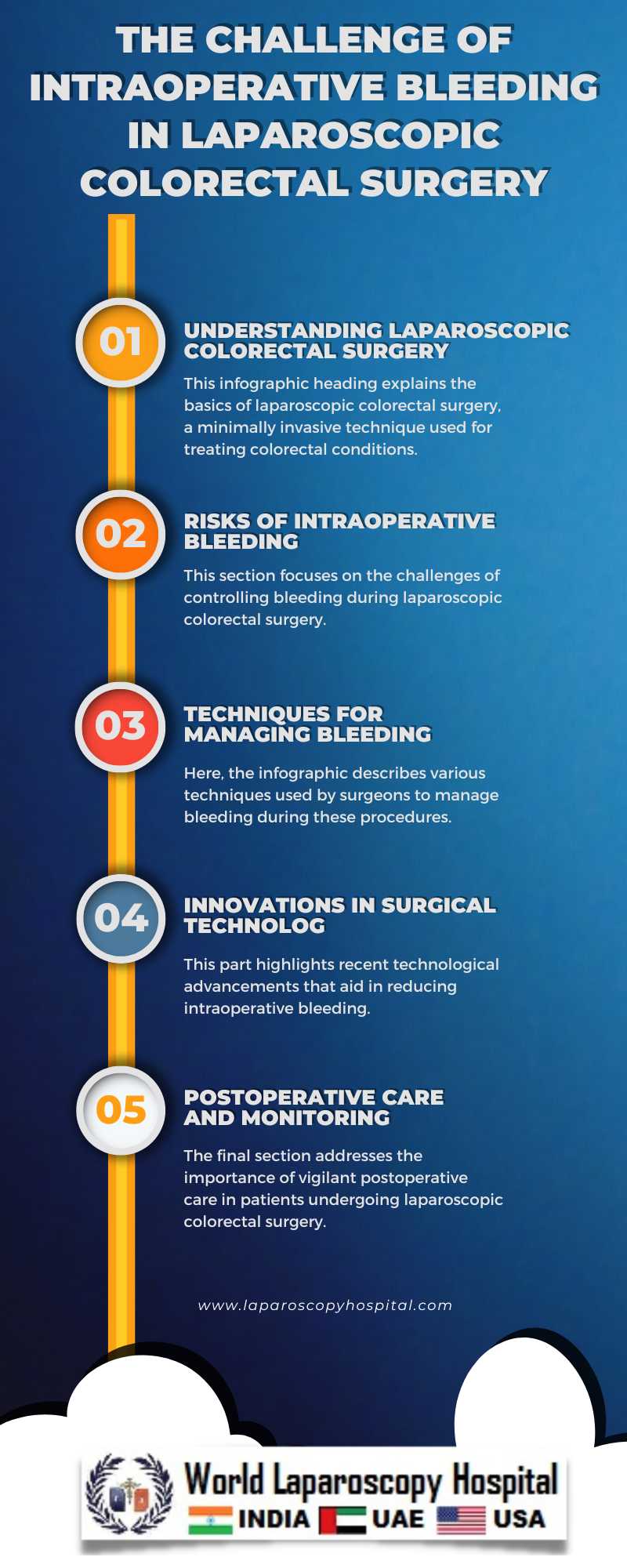The Challenge of Intraoperative Bleeding in Laparoscopic Colorectal Surgery
Introduction:
Laparoscopic colorectal surgery, a minimally invasive technique used for the treatment of various colorectal conditions including cancer, diverticulitis, and inflammatory bowel disease, has gained widespread acceptance due to its advantages such as reduced postoperative pain, shorter hospital stay, and quicker return to normal activities. Despite these benefits, intraoperative bleeding remains a significant challenge that can impact surgical outcomes, patient safety, and overall success of the procedure.

Understanding the Complexity:
The complexity of intraoperative bleeding in laparoscopic colorectal surgery arises from multiple factors. The limited field of view and working space in laparoscopy, the proximity of major blood vessels to the operative field, and the potential for adhesions or altered anatomy, especially in patients with prior surgeries or inflammatory conditions, all contribute to this challenge.
Technological Advances and Techniques:
In response to these challenges, various technological advances and techniques have been developed. High-definition cameras and advanced imaging techniques like near-infrared fluorescence imaging have enhanced the surgeon's ability to visualize blood vessels and identify bleeding sources. The use of energy devices that coagulate and cut tissues has also been a significant advancement. Furthermore, meticulous surgical technique, including proper patient positioning, careful dissection, and gentle tissue handling, is crucial in minimizing the risk of bleeding.
Training and Experience:
The role of surgeon’s experience and training cannot be overstressed. Surgeons with extensive experience in laparoscopic techniques have a lower incidence of intraoperative complications, including bleeding. Training programs and simulation-based learning have become essential in preparing surgeons to handle these challenges effectively.
Management of Intraoperative Bleeding:
When bleeding occurs, prompt and efficient management is critical. This includes controlling the source of bleeding, ensuring clear visualization of the surgical field, and stabilizing the patient hemodynamically. Conversion to open surgery, though considered a setback in minimally invasive surgery, should be readily considered if bleeding cannot be controlled laparoscopically.
Patient Selection and Preoperative Planning:
Careful patient selection and thorough preoperative planning play a vital role in mitigating the risk of intraoperative bleeding. Preoperative imaging studies can help in understanding patient-specific anatomy and planning the surgical approach. Patients with a high risk of bleeding may require more extensive preoperative preparation or alternative surgical strategies.
Conclusion:
Intraoperative bleeding in laparoscopic colorectal surgery presents a significant challenge that demands a combination of advanced technology, surgical skill, and meticulous planning. Ongoing research and development in surgical techniques and technologies continue to reduce the incidence and impact of this complication, improving outcomes for patients undergoing these procedures. The commitment to continuous learning and improvement is essential for surgeons to overcome this challenge effectively.
Laparoscopic colorectal surgery, a minimally invasive technique used for the treatment of various colorectal conditions including cancer, diverticulitis, and inflammatory bowel disease, has gained widespread acceptance due to its advantages such as reduced postoperative pain, shorter hospital stay, and quicker return to normal activities. Despite these benefits, intraoperative bleeding remains a significant challenge that can impact surgical outcomes, patient safety, and overall success of the procedure.

Understanding the Complexity:
The complexity of intraoperative bleeding in laparoscopic colorectal surgery arises from multiple factors. The limited field of view and working space in laparoscopy, the proximity of major blood vessels to the operative field, and the potential for adhesions or altered anatomy, especially in patients with prior surgeries or inflammatory conditions, all contribute to this challenge.
Technological Advances and Techniques:
In response to these challenges, various technological advances and techniques have been developed. High-definition cameras and advanced imaging techniques like near-infrared fluorescence imaging have enhanced the surgeon's ability to visualize blood vessels and identify bleeding sources. The use of energy devices that coagulate and cut tissues has also been a significant advancement. Furthermore, meticulous surgical technique, including proper patient positioning, careful dissection, and gentle tissue handling, is crucial in minimizing the risk of bleeding.
Training and Experience:
The role of surgeon’s experience and training cannot be overstressed. Surgeons with extensive experience in laparoscopic techniques have a lower incidence of intraoperative complications, including bleeding. Training programs and simulation-based learning have become essential in preparing surgeons to handle these challenges effectively.
Management of Intraoperative Bleeding:
When bleeding occurs, prompt and efficient management is critical. This includes controlling the source of bleeding, ensuring clear visualization of the surgical field, and stabilizing the patient hemodynamically. Conversion to open surgery, though considered a setback in minimally invasive surgery, should be readily considered if bleeding cannot be controlled laparoscopically.
Patient Selection and Preoperative Planning:
Careful patient selection and thorough preoperative planning play a vital role in mitigating the risk of intraoperative bleeding. Preoperative imaging studies can help in understanding patient-specific anatomy and planning the surgical approach. Patients with a high risk of bleeding may require more extensive preoperative preparation or alternative surgical strategies.
Conclusion:
Intraoperative bleeding in laparoscopic colorectal surgery presents a significant challenge that demands a combination of advanced technology, surgical skill, and meticulous planning. Ongoing research and development in surgical techniques and technologies continue to reduce the incidence and impact of this complication, improving outcomes for patients undergoing these procedures. The commitment to continuous learning and improvement is essential for surgeons to overcome this challenge effectively.
2 COMMENTS
Dr. Alisha Dayal
#1
Feb 14th, 2024 7:21 am
Laparoscopic colorectal surgery, favored for its minimal invasiveness and speedy recovery, is highly regarded for treating colorectal conditions. However, intraoperative bleeding poses a notable challenge, underscoring the importance of careful management for successful outcomes.
Dr. D Stamey
#2
Feb 27th, 2024 5:48 pm
Intraoperative bleeding in laparoscopic colorectal surgery poses a significant challenge, requiring advanced technology, surgical expertise, and careful planning. Ongoing research and development aim to minimize its occurrence, enhancing patient outcomes. Surgeons must remain committed to continuous learning and improvement to effectively address this challenge.
| Older Post | Home | Newer Post |





